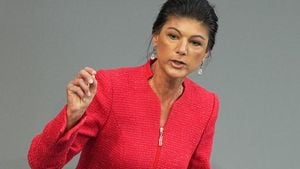After five seasons, the psychological thriller series You has concluded its gripping narrative, leaving fans with a mix of satisfaction and contemplation. The final season, which premiered on April 24, 2025, on Netflix, sees the return of Joe Goldberg, played by Penn Badgley, to New York City, the city where his chaotic journey began. As he navigates his life with Kate Lockwood, portrayed by Charlotte Ritchie, the series delves into themes of obsession, morality, and the consequences of one’s past actions.
Season 5 consists of ten episodes, all available for binge-watching. It picks up three years after Joe left London with Kate, who has now become the CEO of the Lockwood Corporation. Joe, initially portrayed as a reformed character, attempts to embrace his new life as a devoted husband and a public figure dubbed "Prince Charming." However, his dark past and hidden obsessions soon threaten the stability he has tried to build.
Showrunners Michael Foley and Justin W. Lo confirmed that the conclusion of You was always planned to occur in this fifth season. Foley stated, "We liked the idea of bringing Joe back to where it all started—New York." This season intricately explores how much Joe has changed since the audience first met him, juxtaposing his past with his present.
The final season introduces new characters while reuniting fans with familiar faces. Alongside Badgley and Ritchie, the cast includes Madeline Brewer as Bronte, Griffin Matthews as Teddy Lockwood, and Anna Camp portraying dual roles as Raegan and Maddie Lockwood. The series has always been known for its sharp writing and social commentary, and this season is no different.
As the season unfolds, Bronte, a character linked to Joe’s past, seeks to expose him for the monster he is. The tension escalates as she attempts to entrap Joe, ultimately leading to a shocking confrontation where she shoots him in the genitals, a symbolic act of retribution against his misogynistic tendencies. This moment serves as a pivotal turning point in the narrative, highlighting the consequences of Joe's actions throughout the series.
In the finale, Joe is ultimately convicted for the murders of Beck and Love, with first-degree murder convictions also extending to Beck's boyfriend, Benjamin Ashby III, and her best friend, Peach Salinger. The false conviction of Dr. Nicky is vacated, providing a sense of closure for characters wronged by Joe's manipulations.
One of the most poignant moments comes when Bronte, through a voiceover, reflects on Joe's legacy: "One thing's clear: Joe Goldberg will never be free again." This statement encapsulates the series' exploration of the cyclical nature of violence and obsession, leaving viewers to ponder the implications of Joe's actions.
As the season progresses, viewers witness the fates of various characters. Kate Lockwood, who initially seems to be in danger, survives the chaos and emerges as a stronger individual. She hands over her company to her half-brother, Teddy, and focuses on raising her son, Henry, while supporting the artist Marienne Bellamy, whom Joe had previously pursued.
Nadia, a character who had been wrongfully imprisoned due to Joe's machinations, finds her freedom and seeks justice alongside Kate. She returns to her passion for writing and teaching, symbolizing a form of redemption and empowerment.
Meanwhile, Maddie and Harrison, who have their own tumultuous history involving murder and deception, find a semblance of happiness. Maddie goes to rehab and becomes a surrogate mother, while Harrison embraces his family life, showcasing the complexities of their characters amidst the chaos.
As the final moments of You unfold, Joe is left in a prison cell, reflecting on his life and the societal issues surrounding his actions. In a haunting voiceover, he muses, "Maybe the problem isn't me. Maybe it's you," challenging the audience to confront their complicity in the glorification of his character. This meta-commentary serves as a stark reminder of the blurred lines between fiction and reality, urging viewers to examine their own perceptions of morality.
The series ends with the somber tones of Radiohead's "Creep," echoing the themes of isolation and self-reflection that permeate Joe's journey. As he grapples with the consequences of his actions, the audience is left to ponder the darker aspects of human nature and the allure of the flawed antihero.
Ultimately, You has captivated audiences with its blend of psychological intrigue and social critique, challenging viewers to engage with complex themes of love, obsession, and the consequences of one's choices. As the curtain falls on Joe Goldberg's story, fans are left with a haunting reminder of the fine line between love and obsession, and the darkness that can lurk within us all.






